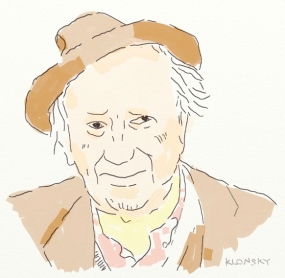Studs Terkel by Alan Wieder.

“I’m writing a book about Studs,” he told me.
I read the book this weekend.
When I first came to Chicago in 1973 I prepared for my life here by reading three books: Boss by Mike Royko. Black Metropolis: A Study of Negro Life in a Northern City by St. Clair Drake and Horace Cayton, first published in 1945. And Division Street America by Studs Terkel.
Another Studs Terkel memory.
One summer years ago, we were staying with my in-laws at their Adirondack camp in Essex on Lake Champlain in upstate New York. We saw that they were doing a production of Working, a musical based on one of Studs’ books of oral testimonies at the Westport Summer theater. Sitting inside a converted barn on chairs set up among bales of hay, miles from Chicago, we herd the literary voice of Studs Terkel turned into song.
I’m sorry to say that I never personally met Studs. Reading the book, I must be the only one in Chicago who never did. He seems to have interviewed everyone else I know. How did he miss me?
“One of the great listeners of the 20th Century,” quotes Alan Wieder. To me he was one of the great voices of the 20th Century. Which made me one of the lucky listeners of the 20th Century.
In my early Chicago years there were three radio voices: Herb Kent (the Kool Gent). Ray Nordstrand, who hosted The Midnight Special on WFMT. And Studs. One of the benefits of working a swing shift at US Steel Southworks was that at least two out of three weeks I could listen to Studs on his daily program which continued until 1997.
Alan Wieder’s book traces Studs life – and Chicago ‘s cultural and political life – through it all: Our battles against racism, the Black List, the fight against imperial wars, both Mayor Daleys, the Sixties Revolt and Harold Washington, our first Black Mayor. Wieder tells the story of how an NBC executive in New York called Studs into his office in 1952. Studs’ Place was an early Chicago TV show set in a greasy spoon diner. The show featured the continuing subject of all of Studs’ work: Working class people.
Studs had never seen a petition he didn’t sign or a left-wing political rally he didn’t appear at, and this was the height of the McCarthy era. The NBC executive offered to save Studs’ Place if Studs recanted his good work. “Why don’t you say you were dumb, you were stupid, you were duped.”
Imagine saying that to a guy from Chicago.
Studs Terkel. Politics, Culture, but Mostly Conversation
Alan Wieder
Monthly Review Press
No comments:
Post a Comment